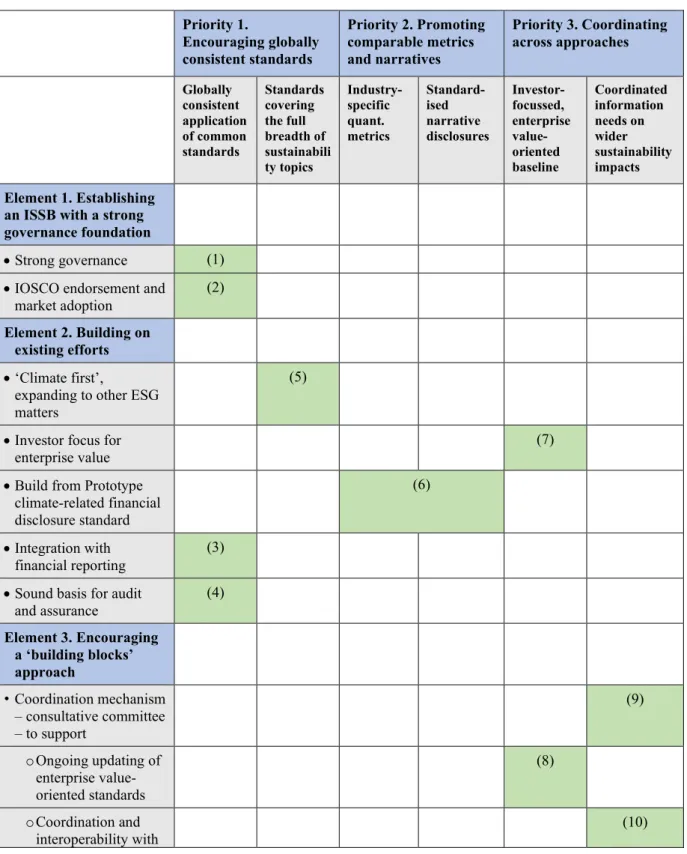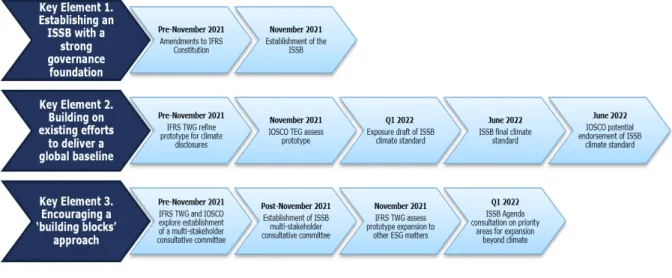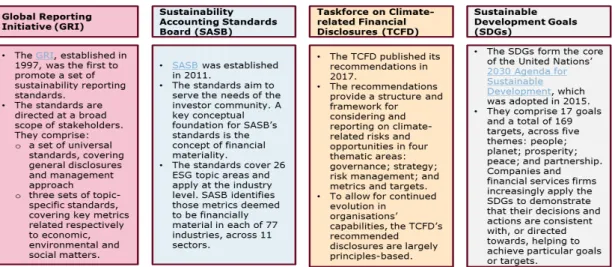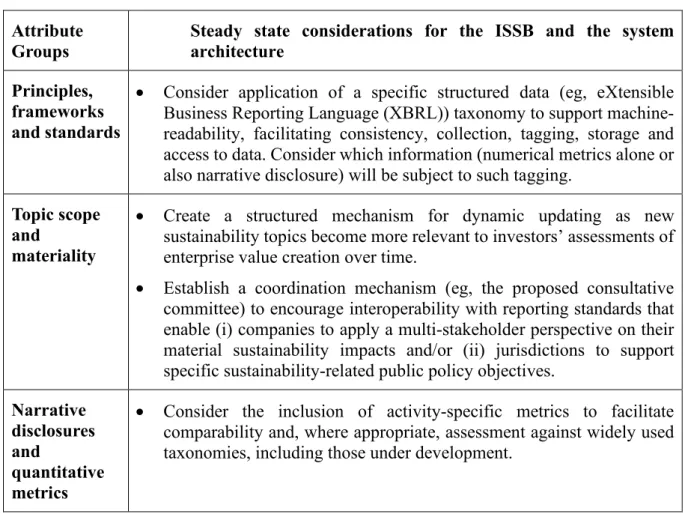IOSCO is working with the IFRS Foundation Trustees as they make the technical preparations for the establishment of the ISSB – including through the IOSCO Chair of the Monitoring Board. In parallel with the TWG, the IFRS Foundation Trustees are investigating the establishment of such a committee.
Introduction
Given the urgent need to improve the consistency, comparability and reliability of sustainability reporting, IOSCO will closely monitor any developments and will encourage the timely delivery and implementation of the key elements in support of its vision. There is considerable momentum behind industry and official sector initiatives in this area, notably the IFRS Foundation's work to establish an ISSB.
Background and context
Background on previous IOSCO work
In April 2020, IOSCO published its report on sustainable finance and the role of securities regulators and IOSCO. This provided an overview of existing sustainable finance initiatives, both from regulators and industry, as well as a detailed analysis of the most important international ESG-related initiatives and third-party frameworks and standards.
Developments in the international sustainability reporting landscape
The feedback received showed widespread support for the IFRS Foundation to play a key role in global sustainability reporting and for the establishment of the ISSB within the governance structure of the IFRS. A January 2020 report from the WEF's International Business Council (IBC) – comprising some of the largest global companies – likewise notes that “the absence of a widely accepted international framework for reporting the material aspects of ESG and other relevant considerations for long-term value.
Sustainability reporting in the European Union
In the accompanying material and the considerations of the proposal, the European Commission expresses its support for global initiatives by the G20, the G7, the FSB and others to develop a baseline of global sustainability reporting standards, and expressly mentions the IFRS Foundation's ISSB -initiative and the proposals of the alliance of leading sustainability reporting organizations that build on the work of the TCFD. The proposed EU sustainability reporting standards will build on and contribute to standardization initiatives at global level.
Investors’ information demands and reporting gaps and shortcomings
High-level overview of observations
Detailed summary of observations
- The completeness, consistency and comparability of sustainability-related information
- Existing principles and frameworks
- Topic scope and materiality
- Narrative disclosures and quantitative metrics
- Linkage between sustainability reporting and business strategies/ financial implications
In the absence of a common binding international standard, asset managers see value in systematic reporting of investee companies against established frameworks. Asset managers want to see the connection between a company's sustainability risks and opportunities and its business, strategy and finances.
Materiality of sustainability-related information
- The objectives and principles of securities regulation
- Different materiality lenses
- Overlaps in reporting under the two materiality lenses
- Convergence of information needs over time
This dual approach is reflected in the focus of the leading voluntary sustainability reporting organizations. In particular, the external sustainability effects of a company can be linked back to the financial performance and position of a company in the short, medium or long term. In the long run, any externalities that are not internalized can be expected to trigger a regulatory response.
In the case of climate-related externalities, for example, the UN PRI refers to Inevitable Policy Response. Overlap between metrics/disclosures in GRI multi-stakeholder standards and climate-related metrics/disclosures captured in prototype – the oil and gas industry. Sustainability matters may be material for disclosure to investors in a given reporting period if it is reasonably possible that they affect the company's business model in the short, medium or long term.

Priorities and mechanisms to improve sustainability-related disclosures
Priority areas of improvement
Encourage progress towards globally consistent application of a common set of international standards for sustainability-related disclosure across jurisdictions, covering the breadth of sustainability topics and leveraging existing principles, frameworks and guidance. As shown in the summary of findings in Section 3, asset managers believe that common international standards covering the breadth of sustainability topics and leveraging existing principles, frameworks and guidance would: help fill important data gaps; better inform pricing and capital allocation decisions; address selective disclosures; and support time series analysis and digitization and storage of sustainability-related information. To promote international consistency of sustainability-related disclosures with a focus on corporate value creation, while supporting mechanisms to coordinate investors' information needs on broader sustainability impacts – and (i) to promote closer integration of these two aspects with reporting under applicable accounting standards frameworks and (ii) ) facilitate independent security for corporate information.
Furthermore, also as described in Section 4, standards that adopt an enterprise value lens must recognize the dynamic nature of sustainability issues – recognizing that scientific knowledge and societal expectations regarding sustainability issues are constantly evolving. In Section 3, we identified a perceived lack of clarity and consistency around the purpose and scope of assurance, together with material differences in audit processes, the profile and independence of and requirements to be followed by assurance providers of sustainability-related information. IOSCO notes that the International Federation of Accountants (IFAC) is also conducting research and analysis on the current status of audit and assurance of sustainability reporting.
Key elements of IOSCO’s vision to deliver the priorities for improvement
IOSCO has encouraged the direction of this initiative and is working closely with the IFRS Foundation Trustees as they make technical preparations for the establishment of the ISSB. One of the key benefits of a solution under the IFRS Foundation is bringing financial and sustainability reporting closer together. Attention to the creation of enterprise value can also better align with the existing mission of the IFRS Foundation, the existing governance structure and the current composition of the Monitoring Board and Trustees.
IOSCO welcomes further consideration of the prototype as a potential basis for the ISSB's standard development. The IFRS Foundation Trustees and the alliance have expressed public support for the building blocks approach. IOSCO suggested that a multi-stakeholder expert advisory committee, within the IFRS Foundation structure, could be a promising mechanism to support the practical delivery of the building blocks approach.

IOSCO’s engagement with stakeholders
High-level assessment of existing content
Attributes of a common international reporting standard for sustainability
Provide investors with the information they need to accurately assess the impact of sustainability issues on companies' ability to create and sustain enterprise value. Assume that we are investor-oriented, with attention to the importance of sustainability issues to create corporate value. Provide guidelines for standardized/consistent and detailed management discussion and analysis in specific content elements.
Provide guidelines for disclosing, discussing and analyzing the quantitative impact of sustainability issues on financial performance. Provide guidelines for consistent discussion and analysis in specific content elements and facilitate integration with financial reporting standards. Provide a framework that can be integrated with financial reporting standards and facilitate independent audit and assurance.
Existing content of TCFD and the alliance of sustainability reporting organisations
CDP's and CDSB's frameworks have been adapted to incorporate elements of, or refer to, TCFD's recommendations. SASB specifies activity measures that can be normalized for the scale of the reporting entity and also provides an industry-specific materiality filter. Neither framework provides a structured mechanism for dealing with the dynamic nature of materiality.
None of the frameworks require gap analyzes against science-based climate parameters (eg, alignment with 1.5o C/<2o C pathways). All six frameworks provide high-level guidance on the impact of sustainability issues on financial planning and performance. None of the frameworks provide practical guidance or standardized narratives on financial statement linkages or integration with financial reporting standards.
Assessment of the Prototype climate-related financial disclosure standard
The purpose of this task was to identify: (i) possible improvements to the prototype to meet the needs of the investors; (ii) interim instructions required prior to the establishment of the ISSB; and (iii) long-term considerations of the ISSB's established operations. Some of the areas for potential future improvement of the prototype identified by the STF relate to the conceptual framework and presentation standard, but not the disclosure standards. Provide guidance to ensure interoperability of ISSB standards as they become available with disclosures of other standards and broader reporting obligations.
Provide guidance on methods for measuring the long-term economic impact of the most relevant sustainability issues. Provide guidance on how information should be integrated with the narrative part of the annual report. IOSCO will continue to engage with the IFRS Foundation Trustees on these issues, including through the collaboration between the TEG and the IFRS Foundation Trustees' TWG.

A consultative committee under the IFRS Foundation
A consultative committee within the IFRS structure
The Advisory Committee is tasked with formalizing and streamlining the ISSB's engagement with the relevant global stakeholders involved in sustainability reporting to identify and provide structured input into the broad universe of sustainability topics (and metrics) – the 'super set' – that are potentially relevant from a corporate value creation perspective. A further objective of the Advisory Committee would be to engage in jurisdictional approaches and promote interoperability between ISSB global standards and any jurisdiction-specific standards in additional blocks that may extend beyond ISSB standards. When determining the organization, structure and composition of the advisory committee, inspiration could be drawn from the current advisory and advisory committees that support the IFRS Foundation.
An advisory subcommittee could be established to advise on the superset of sustainability topics and assist the ISSB in filtering those that may be material from an enterprise value creation perspective. The aim would be to promote a two-way dialogue between standard setters with a view to supporting interoperability between the ISSB's global baseline and jurisdiction-specific additions. It is important that the consultative committee should complement existing advisory groups and outreach arrangements within the IFRS Foundation's architecture and not supplant or supersede them.
Next steps for IOSCO
This is an important part of IOSCO's next STF steps in sustainability-related financial disclosures, which include the following main lines of work. i) Monitor the plans of the IFRS Foundation Trustees for the design of the ISSB. IOSCO looks forward to participating in the IFRS Foundation's assessment of the 'requirements for success' for the ISSB. An important part of the IFRS Foundation Trustees'. technical preparations is their work on the content of future sustainability-related financial reporting standards.
Together with WEF and Deloitte, the IMP facilitated the introduction of a prototype standard for climate-related financial disclosures in December 2020 (see below). Members are appointed by the Trustees of the IFRS Foundation through an open and rigorous process that includes advertising vacancies and advising relevant organisations. Council (IFRS AC) The official advisory body providing strategic advice to the Trustees of the IFRS Foundation and the IASB, established in 2001.
Established in January 2009 with the aim of 'providing a formal link between Trustees and public authorities' in order to increase the public accountability of the IFRS Foundation. The TWG will provide technical recommendations, including further development of the Prototype climate standard as a potential basis for the ISSB once established.







